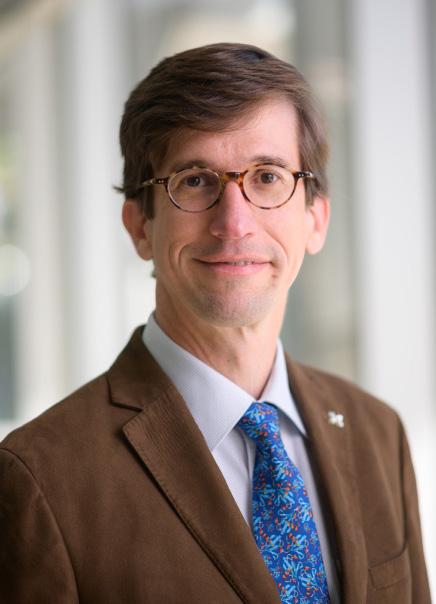
4 minute read
From The Chair
Dear Readers,
Greetings from the beautiful city of Ann Arbor.
As the seasons change, I have been reflecting on the remarkable ups and downs of the last twelve months. Last spring, we were in a near-total lockdown with only essential research taking place on campus. Our students were sent home, and all our teaching activities were conducted online. In the Fall, thanks to the painstaking work of many staff members and academics throughout the university, we welcomed back cohorts of both PhD and MS students. We adopted both in-person and online teaching and resumed research, while containing the spread of coronavirus. It was impressive to see how our faculty hastened the integration of emerging technologies for teaching and running their research programs remotely. I am extremely proud of how the University of Michigan Physiology Family looked out for one another and the various ways we as biomedical scientists are contributing to the global effort to combat COVID-19 and other diseases.
This past year, our two main objectives have been to protect the health of our faculty, scientists, students, trainees and staff, while protecting our missions of research and teaching. Although it has been a difficult year, and many of us have suffered in myriad ways, many achievements have been made. We have learned new ways of working remotely, implemented asynchronous pedagogic techniques, and have engaged with more alumni than ever before. We must hold on to those insights as we return to normalcy.
The pandemic has had devastating consequences for our national society and for the world. Historians and social scientists are arguing about the profound consequences of the SARS-CoV-2 pandemic and how societies might be affected in the future. There is, however, something that cannot be denied: ideas once imagined as long-term projects are now treated as achievable aims! Early on, there was much doubt over the prospect of a vaccine; it can take over 10 years to develop an effective vaccine. However, now, in the span of just 10 months, we have six working ones. The scientific successes in our fight against SARS-CoV-2 and COVID-19 are renewing hopes around long-elusive goals of treating diseases we once considered impossible to cure. The same creative catalyst that saw the vaccine rolled out at breakneck speed without compromising the rigorous analysis is active across our academic enterprise. I am glad that research groups at University of Michigan are actively working collaboratively to combat SARS-CoV-2 and investigate the physiological mechanisms of COVID-19; this includes some of our laboratories in the Department of Molecular & Integrative Physiology.
While navigating the pandemic, we have continued to prioritize efforts to remain one of the top physiology departments in the world through outstanding contributions to research, education and service. Accordingly, there is much more to be thankful for as we continue to develop the Physiology at Michigan. For example, we have regained our status as the top NIH funded physiology department in the nation. Further, in the 2020 edition of PHYSIOLOGY MATTERS, we
transferred the editorial control of our newsletter to graduate students and postdoctoral fellows, thus giving them the unique opportunity of interacting with members of the Physiology family. Reflecting on these developments, I am very excited and optimistic about the future.
As a department, we will continue focusing on the well-being of our trainees, faculty and staff as we start slowly transitioning back to full-time, in-person research and educational activities over the next year. If you wish to support our philanthropy efforts, we are asking for your contributions in two areas. The first is our Physiology Annual Fund, which allows us to direct resources where they are most needed as we emerge from COVID-19. The second is our MS, PhD and Postdoctoral Education Funds, which enables us to support our domestic and international students from all backgrounds and working in any area of physiology.
On a personal note, I want to thank all members of the Physiology family for the support over the last four years of service as interim department chair. After a national search for the permanent chair of our department, Dr. Marschall Runge (Dean, Medical School) and Dr. Steve Kunkel (Vice Dean for Research, Medical School) has given me the privilege to serve as the permanent chair of our department. I am humbled and grateful to all of you for your support throughout this process and will do my utmost best to carry the enormous responsibility that comes with the Chair’s office.
It is impossible to overstate the full historical importance and consequence of serving as the chair of a department that has been in existence since 1882. Physiology at Michigan has played a central role in nurturing generations of physiologists through its research, mentoring and education, and service opportunities. Together, we will continue recruiting exceptional faculty, developing new research and educational programs, and pioneering initiatives to advance and promote the careers of all our department members. The department has been effective because of its large, active and engaged membership at all levels, from undergraduate researchers just starting to emeritus faculty members, alumni and friends.
I am delighted to continue to work with you and share the responsibility of championing our department’s history as well as its future, so that successive generations may inherit the grit, collegiality and substance that has made our department what it is today.
Yours faithfully,
Santiago Schnell Chair, Department of Molecular & Integrative Physiology John A. Jacquez Collegiate Professor of Physiology










